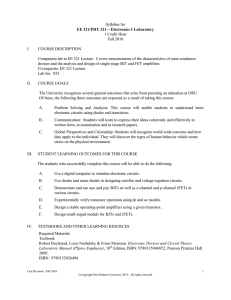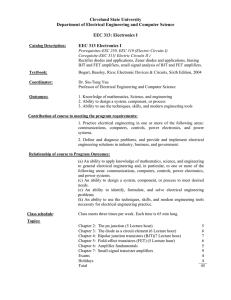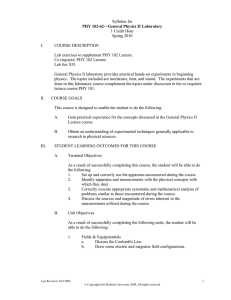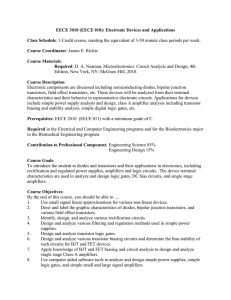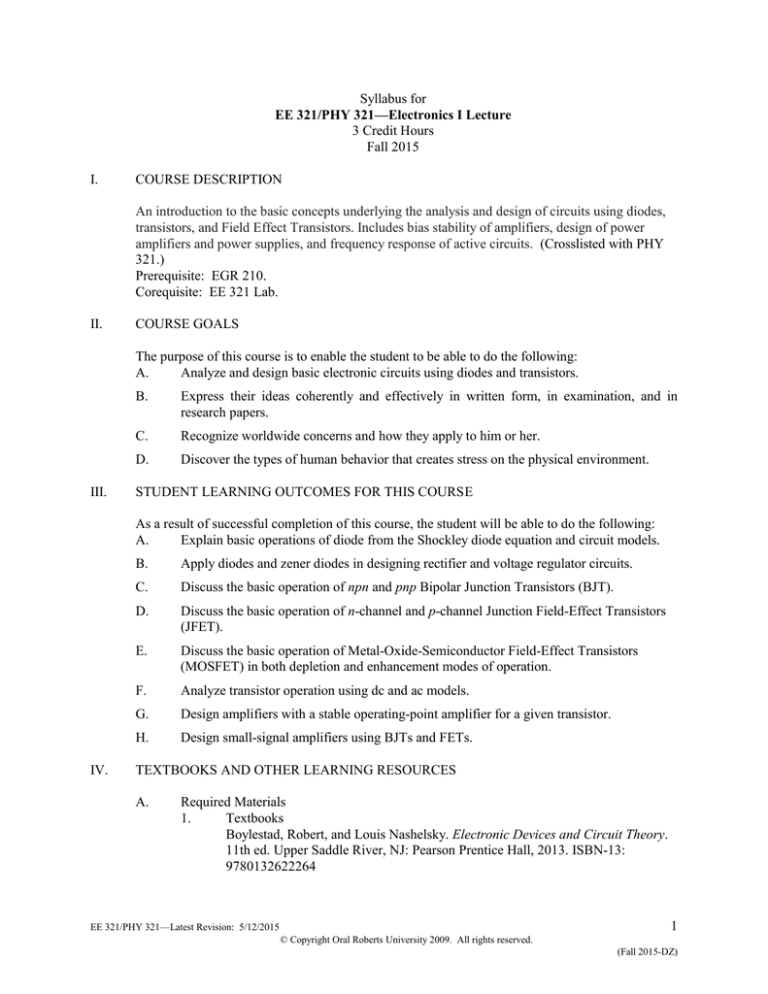
Syllabus for
EE 321/PHY 321—Electronics I Lecture
3 Credit Hours
Fall 2015
I.
COURSE DESCRIPTION
An introduction to the basic concepts underlying the analysis and design of circuits using diodes,
transistors, and Field Effect Transistors. Includes bias stability of amplifiers, design of power
amplifiers and power supplies, and frequency response of active circuits. (Crosslisted with PHY
321.)
Prerequisite: EGR 210.
Corequisite: EE 321 Lab.
II.
COURSE GOALS
The purpose of this course is to enable the student to be able to do the following:
A.
Analyze and design basic electronic circuits using diodes and transistors.
III.
B.
Express their ideas coherently and effectively in written form, in examination, and in
research papers.
C.
Recognize worldwide concerns and how they apply to him or her.
D.
Discover the types of human behavior that creates stress on the physical environment.
STUDENT LEARNING OUTCOMES FOR THIS COURSE
As a result of successful completion of this course, the student will be able to do the following:
A.
Explain basic operations of diode from the Shockley diode equation and circuit models.
IV.
B.
Apply diodes and zener diodes in designing rectifier and voltage regulator circuits.
C.
Discuss the basic operation of npn and pnp Bipolar Junction Transistors (BJT).
D.
Discuss the basic operation of n-channel and p-channel Junction Field-Effect Transistors
(JFET).
E.
Discuss the basic operation of Metal-Oxide-Semiconductor Field-Effect Transistors
(MOSFET) in both depletion and enhancement modes of operation.
F.
Analyze transistor operation using dc and ac models.
G.
Design amplifiers with a stable operating-point amplifier for a given transistor.
H.
Design small-signal amplifiers using BJTs and FETs.
TEXTBOOKS AND OTHER LEARNING RESOURCES
A.
Required Materials
1.
Textbooks
Boylestad, Robert, and Louis Nashelsky. Electronic Devices and Circuit Theory.
11th ed. Upper Saddle River, NJ: Pearson Prentice Hall, 2013. ISBN-13:
9780132622264
1
EE 321/PHY 321—Latest Revision: 5/12/2015
© Copyright Oral Roberts University 2009. All rights reserved.
(Fall 2015-DZ)
2.
B.
V.
Other
None
Optional Materials
1.
Textbooks
None
2.
Other
None
POLICIES AND PROCEDURES
A.
University Policies and Procedures
1.
2.
3.
4.
5.
Attendance at each class or laboratory is mandatory at Oral Roberts University.
Excessive absences can reduce a student’s grade or deny credit for the course.
Students taking a late exam fee because of an unauthorized absence are charged a
late fee.
Students and faculty at Oral Roberts University must adhere to all laws addressing
the ethical use of others’ materials, whether it is in the form of print, electronic,
video, multimedia, or computer software. Plagiarism and other forms of cheating
involve both lying and stealing and are violations of ORU’s Honor Code: “I will
not cheat or plagiarize; I will do my own academic work and will not
inappropriately collaborate with other students on assignments.” Plagiarism is
usually defined as copying someone else’s ideas, words, or sentence structure and
submitting them as one’s own. Other forms of academic dishonesty include (but
are not limited to) the following:
a.
Submitting another’s work as one’s own or colluding with someone else
and submitting that work as though it were his or hers;
b.
Failing to meet group assignment or project requirements while claiming
to have done so;
c.
Failing to cite sources used in a paper;
d.
Creating results for experiments, observations, interviews, or projects that
were not done;
e.
Receiving or giving unauthorized help on assignments.
By submitting an assignment in any form, the student gives permission
for the assignment to be checked for plagiarism, either by submitting the
work for electronic verification or by other means. Penalties for any of
the above infractions may result in disciplinary action including failing
the assignment or failing the course or expulsion from the University, as
determined by department and University guidelines.
Final exams cannot be given before their scheduled times. Students need to check
the final exam schedule before planning return flights or other events at the end of
the semester.
Students are to be in compliance with University, school, and departmental
policies regarding Whole Person Assessment requirements. Students should
consult the Whole Person Assessment handbooks for requirements regarding
general education and the students’ majors.
a.
The penalty for not submitting electronically or for incorrectly submitting
an artifact is a zero for that assignment.
b.
By submitting an assignment, the student gives permission for the
assignment to be assessed electronically.
2
EE 321/PHY 321—Latest Revision: 5/12/2015
© Copyright Oral Roberts University 2009. All rights reserved.
B.
Department Policies and Procedures
1.
A fee of $15.00 is assessed for all late exams. The university’s late exam policy
applies to all exams taken without notifying the professor prior to the regularly
scheduled exam time and to all exams taken late without an administrative excuse.
2.
Any student whose unexcused absences total 33% or more of the total number of
class sessions receives an F for the course grade.
C.
Course Policies and Procedures
1.
Evaluation Procedures
Homework
15%
Project
15%
Exam 1
20%
Exam 2
20%
Final Exam
30%
Total
100%
2.
Whole Person Assessment Requirements
None
3.
Other Policies and Procedures
a. Attendance Policy:
Three unexcused absences are allowed to accommodate emergencies and
illnesses. Each unexcused absence thereafter will result in one point
deduction from final score.
Students are expected to be punctual for classes. However, late but less
than 5 minutes will not be counted as late.
Late above 5 minutes but less than 30 minutes will be treated as late.
Students will incur one absence for every two times they are late.
Late for 30 minutes and above will be treated as absence.
Two credit points will be awarded for full attendance.
b. Late homework Policy:
Homework should be turned in within the due date and late submission
will result in reduced grade, 10% deduction for each school day.
No points will be awarded for any assignment that is turned in after that
homework has been graded and already returned to the class.
The above rule also applies to mini-project.
c. Expanded and late exam policy:
Expanded exam is possible only for those with an official letter from the
director of student resources.
Unexcused late exam will be penalized by prorating the grade based on
exam result of the class and how late it is.
Students who missed an exam must schedule the late exam immediately
when they resume the class. Once scheduled, no second chance will be
given. Students come to a late exam must present either an official letter
for administrative absence or a receipt for the payment of late
examination fee.
No late exam is possible for final exam.
3
EE 321/PHY 321—Latest Revision: 5/12/2015
© Copyright Oral Roberts University 2009. All rights reserved.
VI.
COURSE CALENDAR
Chapter
Lecture
Topic
1
Introduction
1
3
Semiconductor diodes: Theory of semiconductors
2
9
Diode application: Rectifiers, voltage regulators, clippers, and clampers.
1
Examination 1
1
Discussion of exam 1
3
2
Bipolar Junction Transistors (BJT): Basic fundamentals
4
3
DC biasing BJT: Analysis and design of CE, CC and CB amplifiers
4
2
DC load line and biasing stability
5
1
Introduction to two-port-network theory
5
5
BJT AC Analysis: re model and hybrid model
5
2
Cascaded Systems: Multistage amplifiers
1
Examination 2
1
Discussion of Exam 2
6
3
Field-Effect Transistors (FET): Basic fundamentals
7
3
FET biasing: Analysis and design of CS and CD amplifiers
8
4
FET amplifiers: FET AC analysis re model and hybrid model
Mini-Project
Final Examination
4
EE 321/PHY 321—Latest Revision: 5/12/2015
© Copyright Oral Roberts University 2009. All rights reserved.
Course Inventory for ORU’s Student Learning Outcomes
EE 321/PHY 321—Electronics I Lecture
Fall 2015
This course contributes to the ORU student learning outcomes as indicated below:
Significant Contribution – Addresses the outcome directly and includes targeted assessment.
Moderate Contribution – Addresses the outcome directly or indirectly and includes some assessment.
Minimal Contribution – Addresses the outcome indirectly and includes little or no assessment.
No Contribution – Does not address the outcome.
The Student Learning Glossary at http://ir.oru.edu/doc/glossary.pdf defines each outcome and each of the
proficiencies/capacities.
OUTCOMES & Proficiencies/Capacities
1
1A
1B
1C
1D
2
2A
2B
2C
2D
2E
Significant
Moderate
Minimal
No
Contribution Contribution Contribution Contribution
Outcome #1 – Spiritually Alive
Proficiencies/Capacities
Biblical knowledge
Sensitivity to the Holy Spirit
Evangelistic capability
Ethical behavior
Outcome #2 – Intellectually Alert
Proficiencies/Capacities
Critical thinking
Information literacy
Global & historical perspectives
Aesthetic appreciation
Intellectual creativity
X
X
X
X
X
X
X
X
X
Outcome #3 – Physically Disciplined
Proficiencies/Capacities
3A Healthy lifestyle
3B Physically disciplined lifestyle
3
4
4A
4B
4C
4D
4E
Outcome #4 – Socially Adept
Proficiencies/Capacities
Communication skills
Interpersonal skills
Appreciation of cultural & linguistic
differences
Responsible citizenship
Leadership capacity
X
X
X
X
X
X
X
5
EE 321/PHY 321—Latest Revision: 5/12/2015
© Copyright Oral Roberts University 2009. All rights reserved.

